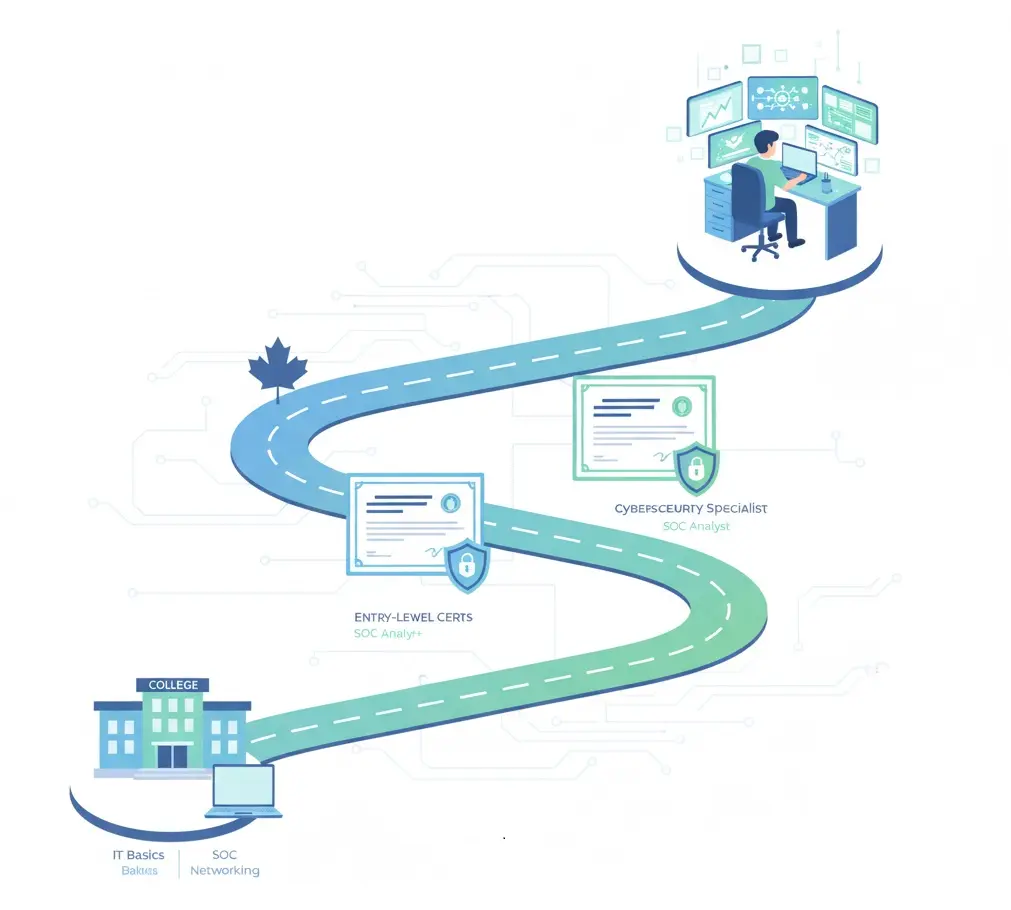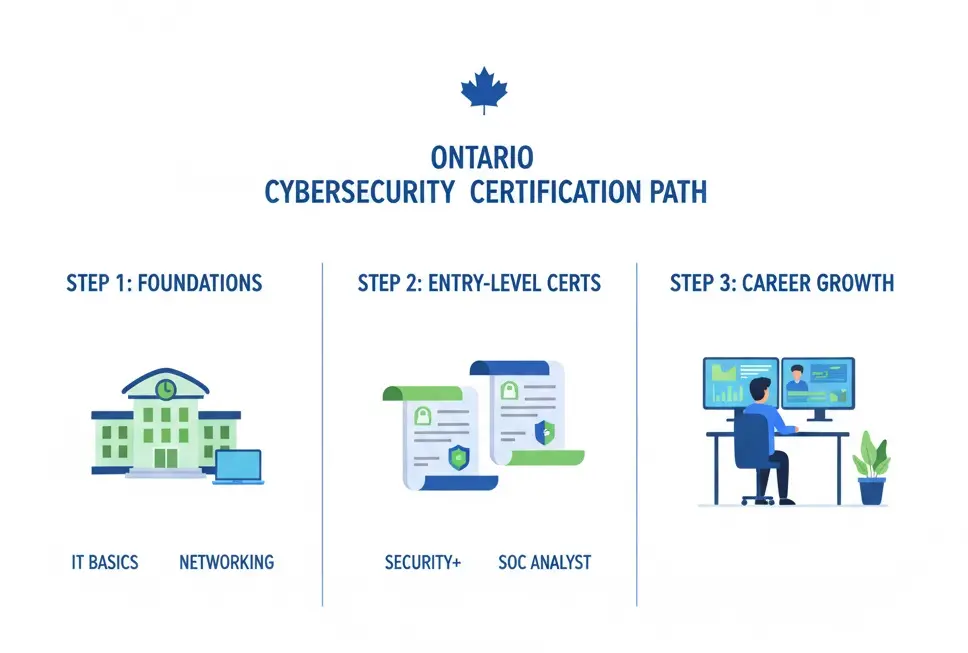Cyber attacks keep growing, and Ontario employers are hiring more people to protect their systems. Job ads for “security analyst,” “SOC analyst,” or “cybersecurity specialist” often list a mix of degrees, experience, and industry certifications.
For students and career changers, this can feel like alphabet soup: Security+, CySA+, CEH, CISSP and more. The good news: you do not need every certification. The right one depends on where you are starting (no IT background vs help desk vs experienced admin) and the roles you are aiming for.

This guide focuses on cybersecurity certifications that make sense in Ontario, how they connect to local college programs, and a simple roadmap you can actually follow.
Read: Software for Students in Ontario
What employers in Ontario really look for
Most cybersecurity job postings in Ontario ask for three things:
- Formal education — often a college diploma/degree in IT, computer science, or a 1-year cybersecurity graduate certificate.
- Hands-on skills — experience with networks, Linux/Windows, cloud platforms, SIEM tools, and incident response.
- Certifications as proof — terms like “CompTIA Security+,” “CISSP,” “CEH,” or “current cybersecurity certification” show up frequently in analyst and SOC roles.
Certifications are rarely a legal “licence” in this field. Instead, they:
- Show employers you meet a baseline skill level.
- Help HR filter applications.
- Can support higher salary bands in senior roles.
Read: Best student bank accounts in Ontario
Three layers of cybersecurity credentials
1. Ontario college and university programs
Ontario colleges and universities now offer many cyber-specific programs, especially one-year graduate certificates aimed at degree/diploma holders:
- Cybersecurity programs at public colleges — 1-year Ontario College Graduate Certificates focused on public and private sector needs.
- Cybersecurity & Threat Management–type programs with hands-on projects and an optional work term.
- Cyber Security programs (at colleges such as Lambton, Conestoga, OntarioLearn partners, Loyalist, Fanshawe, etc.) — graduate certificates and diplomas that cover network defence, incident response, and ethical hacking.
- Operational Technology Cybersecurity programs — focus on securing industrial and OT systems.
Many of these programs either map directly to certifications like Security+ and CySA+ or embed certification prep courses.
Read: Ontario High Demand Careers: Step-by-Step Guides
2. Vendor-neutral industry certifications
These certifications are recognised globally and commonly requested in Ontario job ads:
- CompTIA Security+ (SY0-701) — baseline security skills.
- CompTIA CySA+ / PenTest+ — intermediate analyst and offensive security skills.
- CISSP (Certified Information Systems Security Professional) — advanced certification for experienced professionals designing and managing security programs.
3. Vendor-specific and cloud certifications
Ontario employers also value vendor certifications, especially for cloud-heavy environments:
- Microsoft security and Azure certifications.
- AWS security speciality.
- Cisco security (e.g., security-focused tracks within the Cisco certification path).
These are usually second or third steps after you have built foundations with a diploma plus an entry-level certification.
Read: Personal Support Worker (PSW) in Ontario
Best entry-level cybersecurity certifications for Ontario candidates
If you are a student, recent graduate, or early-career IT worker in Ontario, start with certifications that prove foundational security knowledge.
CompTIA Security+
Security+ is often the first security certification hiring managers recognise.
What it covers:
Network security, identity and access, threats and vulnerabilities, incident response, and basic risk management.
Exam details (SY0-701):
Up to 90 questions, 90 minutes, scaled passing score of 750/900.
Cost:
Around US$425 for the exam (about CA$575–600 at typical recent exchange rates). Fees change, so always confirm current pricing on the official site before budgeting.
Who it suits:
- Ontario college students in IT/networking/cyber programs.
- Help desk or network admins aiming for their first security analyst or SOC role.
In Ontario, many continuing education departments run Security+ prep courses, making it easier to combine college study with certification.
Read: Working While Studying: Hours, SIN, Taxes, and Co‑op Rules
Certified SOC Analyst (CSA)
For candidates targeting Security Operations Centre (SOC) analyst roles, the Certified SOC Analyst (CSA) credential is designed specifically for that environment.
- Focuses on monitoring, triage, and incident escalation in a SOC.
- Is designed to create new entry-level SOC professionals, not just upskill seniors.
- Some employers list “SOC analyst certification” or CSA-style skills in analyst job descriptions.
This is a good option after or alongside Security+ if you know you want a SOC environment.
Other beginner-friendly options
While they are not always “certifications” in the same sense, Ontario candidates increasingly use:
- Introductory cyber courses and microcredentials from local colleges (including OntarioLearn cyber security certificates).
- Vendor beginner badges or “certified in cybersecurity”–style entry credentials as low-cost first steps.
These can build confidence before you pay for bigger exams like Security+.
Advanced certifications once you have experience
CompTIA CySA+ and PenTest+
- CySA+ focuses on detection, monitoring, and incident response — a natural next step after Security+ for security analysts.
- PenTest+ is designed for penetration testing and red-team style work.
Many Ontario professionals move through a path like:
Security+ → CySA+ (or PenTest+) → cloud/vendor security as their responsibilities grow.
CISSP (Certified Information Systems Security Professional)
CISSP is widely viewed as a gold-standard certification for senior security roles.
Key points:
- Aimed at people designing and managing security programs (architects, managers, senior analysts).
- Covers eight broad domains, from risk management and architecture to operations and software security.
- Requires about five years of relevant paid work experience for full certification (you can sit the exam earlier and become an “Associate of CISSP” until you meet the experience requirement).
- Exam cost is around US$749, plus annual maintenance fees.
For most Ontario students, CISSP is a long-term target, not the first certification.
CEH, OSCP and other niche certifications
Some Toronto and Ottawa employers list:
- CEH (Certified Ethical Hacker) — focuses on offensive techniques; recognised in many red-team jobs.
- OSCP (Offensive Security Certified Professional) — a hands-on penetration testing exam with a tough reputation.
These are typically useful after you have strong networking and operating system skills and have completed at least one foundational security cert.
Ontario college programs that map well to certifications
Here are examples of how you can stack Ontario education plus certifications:
- One-year graduate certificates such as Cybersecurity, Cybersecurity & Threat Management, Cyber Security, and Operational Technology Cybersecurity all teach topics that overlap strongly with Security+ and CySA+ domains.
- Online programs (including those delivered through OntarioLearn and college continuing education) let working adults add cybersecurity skills part-time while preparing for entry-level certs.
- Federal guides on cyber programs list many Canadian post-secondary options, including Ontario programs, in one place so you can compare prerequisites and outcomes.
When comparing programs, look for:
- Explicit mention of Security+, CySA+, or other cert prep in the course outline.
- Labs using tools you see in Ontario job ads (SIEM, EDR, cloud platforms).
Cybersecurity certifications in Ontario
| Certification | Level | Typical Ontario roles | Common starting point | Approx exam cost* |
|---|---|---|---|---|
| CompTIA Security+ | Entry | Junior security analyst, SOC analyst, IT security specialist | College IT/cyber student or help desk admin | ~US$425 (≈CA$575–600) |
| Certified SOC Analyst (CSA) | Entry | SOC analyst, security monitoring | After basic networking + Security+ level knowledge | Varies by provider (few hundred US$) |
| CompTIA CySA+ | Intermediate | Security analyst, incident responder | 1–2 years security experience + Security+ | Mid-hundreds US$ |
| CISSP | Advanced | Senior analyst, architect, manager | 5+ years experience in 2+ security domains | ~US$749 + annual fees |
*Fees change frequently and may vary by test centre, currency, and vouchers. Always confirm directly with the exam provider.
How to choose your first (or next) cybersecurity certification

If you are a student or new graduate in Ontario (no IT job yet):
- Prioritise an IT or cybersecurity diploma/degree, or a 1-year graduate certificate from a public college or university.
- Add Security+ as your first certification once your networking and operating system basics feel solid.
If you work in help desk, desktop support, or networking:
- Use Security+ to show you are serious about security.
- Aim for an entry-level analyst or SOC role, then consider CySA+ or CSA next.
If you already have 5+ years in security roles:
- Compare CISSP versus a cloud security path based on your day-to-day work.
- Think about where you want to go: architecture, management, or deep technical specialist.
A simple 12–18 month roadmap for a beginner in Ontario

Months 0–6
- Complete or continue an Ontario IT or cybersecurity program, or build core skills with networking plus Linux/Windows labs.
- Start Security+ study using an official guide and practice exams.
Months 6–12
- Write the Security+ exam.
- Apply for junior analyst or SOC roles; highlight labs, projects, and any volunteer or co-op experience.
Months 12–18
- Once you land your first role, set a goal for one more certification: CySA+, CSA, or a relevant vendor/cloud certification, depending on what your team uses.
This path keeps costs manageable while building skills that match what Ontario employers actually hire for.
Cybersecurity certifications in Ontario FAQs
Is cybersecurity a regulated profession in Ontario like nursing or trades?
No. Cybersecurity roles in Ontario are not provincially licensed in the same way as nurses, electricians, or real estate agents. Employers set their own minimum requirements, which usually include a diploma/degree plus experience, and sometimes specific certifications.
Is CompTIA Security+ alone enough to get a cybersecurity job in Ontario?
On its own, Security+ is rarely enough. Employers typically want Security+ plus some combination of education and hands-on practice, such as a college diploma, home lab, co-op, or IT work experience. However, it can significantly strengthen your application compared to similar candidates without any security certification.
Can international students in Ontario use OSAP to help with cybersecurity certifications?
OSAP usually funds approved post-secondary programs, not standalone certification exams like Security+ or CISSP. Some Ontario college programs that include certification prep may be OSAP-eligible, so you may indirectly get support for certification training through your program, but you normally pay the exam fee separately. Always confirm details with your financial aid office.
Which certification should I choose if I want to be a SOC analyst in Toronto?
A common route is:
1. IT or cybersecurity diploma or 1-year graduate certificate.
2. Security+ for core knowledge.
3. Certified SOC Analyst (CSA) or CySA+ once you are comfortable with logs, SIEM tools, and incident basics.
